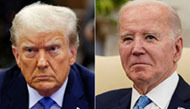It may sound improbable, given the junk-food associations once attached to the man’s name, but few phrases are more bankable to restaurants around the world than this: “Bill Clinton ate here.” Somehow, the 42nd president of the United States has become an arbiter of international fine dining, conferring a sort of informal Michelin star just by showing up.
Mr. Clinton routinely pops up in guidebooks and newspaper articles about restaurants, invariably with the implication that a beloved gourmand has attached his seal of approval. How exactly did Mr. Clinton become earth’s No. 1 international restaurant maven - More than most celebrities, he seems like a person who appreciates good food, and before he had heart surgery, he was known for his wideranging appetite. He is mostly a vegan these days, and during recent travels on behalf of Democratic candidates his diet has included miso barley soup, black bean burritos and cauliflower and potato curry .
Restaurants worldwide
have reason to relish a
presidential visit.
Overseas, however, he’s been know to stray. Celebrity endorsements provide bragging rights for restaurants and Mr. Clinton’s patronage in the United States has provided boosts for places like Il Mulino in Manhattan and Georgia Brown’s in Washington. But when it comes to Bill Clinton and overseas restaurants, the upside is far greater. Managers and owners from Beijing to Iceland say an appearance by Mr. Clinton can be transformational, launching an obscure restaurant to fame and cementing the reputation of well-known favorites. Best of all, the imprimatur seems to last for years.
“We had 25 people from Sweden in here last night,” says Detlef Obermuller, owner of Gugelhof, a Berlin restaurant that was host to Mr. Clinton and Chancellor Gerhard Schroder in 2000.
“I asked one of them, ‘How do you know about this place?’ And she took out a newspaper clipping out of her pocket. I can’t read Swedish, but she told me it was all about Bill Clinton eating here. And that meal was a decade ago.” Not that Mr. Obermuller has forgotten the details.
He and his staff were given a mere 20-minute heads-up by German security before Mr. Clinton arrived. News of the dinner then spread quickly on radio and television, and by the time dessert was served, a crowd of 2,000 had gathered on the sidewalk to greet the man who had declared “Berlin is free!” in a 1994 speech at the Brandenburg Gate. As Mr. Clinton left, journalists swarmed into Gugelhof, scrounging up quotes and details for articles. Amid the chaos, all the cutlery, plates and glasses on Mr. Clinton’s table disappeared. One of the reporters took the dinner check.
(It included Mr. Clinton’s order of choucroute, an Alsatian dish of sauerkraut, beef, pork and potatoes.) The next day, a German newspaper ran an image of the check on its front page. When Mr. Clinton visits a restaurant, everybody in the room knows it. Douglas Band, an aide who travels with Mr. Clinton, and who fielded questions for this article on his behalf, says his boss introduces himself to every diner, as well as every waiter and every kitchen staff member. He will always pose for photographs and sign guest books.
Someone from his staff will send a thank-you note a few days later. Mr. Clinton never asked to be the foreign restaurant anointer-in-chief, but because he has the job, a glaring irony must be noted: He doesn’t research where he eats. In fact, he rarely chooses the restaurants. “I wish I could tell you there is more of a science to it,” Mr. Band said.
“He’s so busy and has so much to do. It’s not like it’s that important to him.” Typically, Mr. Band said, restaurant ideas come from a member of Mr. Clinton’s advance team, who consults a concierge. Convenience often weighs as heavily as flavor. Other times, the restaurant choice is left to local dignitaries. Good fortune, it seems, plays a large role in the Bill Clinton international restaurant sweepstakes.
Mr. Clinton helped a hot dog stand in Reykjavik called Baejarins Beztu Pylsur achieve worldwide acclaim after he stopped there during a visit to Iceland in 2004. But the ex-president nearly walked right by. “I have this nice older woman who has been working for me for 30 years, and she saw Clinton, and she just shouted at him to stop and try one of our hot dogs,”’ said Gudrun Kristmundottir, the stand’s owner.
“And he did.” The next day, TV reporters and newspapers from all over the world were calling. And in 2006, Baejarins Beztu Pylsur (“city’s best hot dogs” in Icelandic) turned up on a list of the five best European food stalls in The Guardian newspaper in England. Inevitably, Mr. Clinton’s stop was noted.
“It was just unbelievable, the amount of attention,” Ms. Kristmundottir said. “I never understood all the fuss over a single hot dog.”
스마터리빙
more [ 건강]
[ 건강]이제 혈관 건강도 챙기자!
[현대해운]우리 눈에 보이지 않기 때문에 혈관 건강을 챙기는 것은 결코 쉽지 않은데요. 여러분은 혈관 건강을 유지하기 위해 어떤 노력을 하시나요?
 [ 건강]
[ 건강]내 몸이 건강해지는 과일궁합
 [ 라이프]
[ 라이프]벌레야 물럿거라! 천연 해충제 만들기
 [ 건강]
[ 건강]혈압 낮추는데 좋은 식품
[현대해운]혈관 건강은 주로 노화가 진행되면서 지켜야 할 문제라고 인식되어 왔습니다. 최근 생활 패턴과 식생활의 변화로 혈관의 노화 진행이 빨라지고
사람·사람들
more많이 본 기사
- 총격 상처 피해 진학한 대학서 또 총기난사… “엄청난 타격”
- ‘계엄2수사단’ 노상원 1심서 징역 2년… “계엄 동력 엄중책임”
- 승부사끼리는 통한다…젠슨 황의 트럼프 공략 비결은
- 총격 상처 피해 진학한 대학서 또 총기난사… “엄청난 타격”
- 트럼프 관세 인하에도… 주요 식품 줄줄이 급등
- 연준 의장 후보 ‘2명의 케빈’… ‘월가 황제’는 누구 지지?
- 지구촌 또 ‘총기 난사’… 미·호주 잇단 참사
- 비극 속 시민의 용기 총격범 맨손 제압
- 인니 수마트라섬 ‘대홍수’
- 시드니 유대인 총기참사 용의자는 50세 아버지·24세 아들
- 트럼프와 여성들 함께 찍힌 ‘엡스타인 사진’ 공개
- “尹, 반대자 반국가세력 몰아…계엄배경에 김건희 사법리스크”
- 19개주, 전문직 비자 ‘10만불 수수료’ 소송
- ‘김민재 점점 독일 국대에 밀린다’ 독일 현지, 타 향해 연일 찬사... “뮌헨 최고의 영입, 진정한 수비 리더”
- 변요한♥티파니, 약지에 ‘커플링·포르쉐’..열애 中 티냈다
- 오늘 추첨 파워볼 잭팟 11억달러로 ‘껑충’
- 중, 난징대학살 추도… ‘일본군 해골 베는 포스터’도
- “성과는 있었지만 아직 끝 아냐”
- 연말 DUI 집중 단속 무관용 강력 처벌
- 백악관 연회장 신축 저지 소송 국가역사보존단체, 연방지법에
- 존 이 시의원, 선물 수수 ‘윤리 위반’
- 항공기 승객정보 활용 추방 확대
- [이민법 칼럼] 더 힘들어진 취업이민 1순위
- 연방법원, 킬마르 석방 “적법한 추방 명령 없어”
- 뿔난 불가리아 Z세대 총리 사임 ‘초유의 사태’
- 중국 ‘여행자제령’ 직격탄 맞은 일본
- 홍명보 감독, 멕시코 답사 마치고 귀국… “월드컵서 쉬운 조는 없다”
- 통계로 본 올해 대한항공… ‘캡틴 아메리카’ 가장 많이 보고, 최다 방문지 도쿄
- 미, 베네수엘라 지상전 위협… 쿠바까지 흔들기
- ‘아연’의 효과… 올바르게 복용하면 감기 기간 줄일 수도
- 샌안토니오, OKC 17연승 저지…NBA컵 결승 진출
- MLB 도전 송성문에 “5개 팀서 관심”
- 뉴욕 백화점서 아기 기저귀 갈던 엄마, 정신질환자에 흉기피습
- 제트블루 여객기, 카리브해 상공서 미군 급유기와 충돌 위기
- 尹 ‘한덕수 재판 위증’ 재판 내달 13일 시작…특검 추가기소
- “스마트폰 달고 사는 당신, 안구건조증 주의하세요!”
- 검찰, ‘254억 횡령’ 유병언 차남 유혁기에 징역 8년 구형
- 李대통령 “’4·3 강경진압’ 박진경 유공자 등록 취소 검토하라”
- 호주 총격범 제압 시민 영웅은 43세 과일가게 주인 아흐메드 씨
- 조미김, 미국 수출관세 ‘면제’됐다…K-김 최대시장서 날개
- “트럼프, 바이든 데자뷔인줄” 취임 1년새 고령 논란·지지율 뚝
- 故 김지미에 금관문화훈장…마지막 말은 “보고싶다 사랑한다”
- 1년→6개월→0일… “오픈AI, 입사 첫날부터 스톡옵션 부여”
- “머스크처럼…” 미국인 대리모 통해 2세 퍼트리는 中재벌
- [특파원시선] 외식비 줄이는 미국… ‘30% 요구’ 팁 공포도 한몫?
- 日, ‘스마트폰 앱 빅테크 규제법’ 18일 시행…구글·애플 겨냥
- 김지수, 꿀꿀했던 韓 떠났다.. “에펠탑 보니 메마른 낭만 살아나”
- 젤렌스키 “나토 가입 대신 서방 집단방위 보장으로 타협”
- 성탄절 초록잎 아래 5초간 1천435쌍 입맞춤…워싱턴 기네스기록
- 나의 꿈 나의 인생-나폴레온 힐
1/5지식톡

-
 테슬라 자동차 시트커버 장착
0
테슬라 자동차 시트커버 장착
0테슬라 시트커버, 사놓고 아직 못 씌우셨죠?장착이 생각보다 쉽지 않습니다.20년 경력 전문가에게 맡기세요 — 깔끔하고 딱 맞게 장착해드립니다!장착비용:앞좌석: $40뒷좌석: $60앞·뒷좌석 …
-
 식당용 부탄가스
0
식당용 부탄가스
0식당용 부탄가스 홀세일 합니다 로스앤젤레스 다운타운 픽업 가능 안녕 하세요?강아지 & 고양이 모든 애완동물 / 반려동물 식품 & 모든 애완동물/반려동물 관련 제품들 전문적으로 홀세일/취급하는 회사 입니다 100% …
-
 ACSL 국제 컴퓨터 과학 대회, …
0
ACSL 국제 컴퓨터 과학 대회, …
0웹사이트 : www.eduspot.co.kr 카카오톡 상담하기 : https://pf.kakao.com/_BEQWxb블로그 : https://blog.naver.com/eduspotmain안녕하세요, 에듀스팟입니다…
-
 바디프렌드 안마의자 창고 리퍼브 세…
0
바디프렌드 안마의자 창고 리퍼브 세…
0거의 새제품급 리퍼브 안마의자 대방출 한다고 합니다!8월 23일(토)…24일(일) 단 이틀!특가 판매가Famille: $500 ~ $1,000Falcon: $1,500 ~ $2,500픽업 & 배송직접 픽업 가능LA…
-
 바디프렌드 안마의자 창고 리퍼브 세…
0
바디프렌드 안마의자 창고 리퍼브 세…
0거의 새제품급 리퍼브 안마의자 대방출 한다고 합니다!8월 23일(토)…24일(일) 단 이틀!특가 판매가Famille: $500 ~ $1,000Falcon: $1,500 ~ $2,500픽업 & 배송직접 픽업 가능LA…
케이타운 1번가
오늘의 1면
오피니언

22기 LA평통 출범에 거는 기대

연말 시즌 사기·범죄 경계해야
 메건 매카들 워싱턴포스트 칼럼니스트
메건 매카들 워싱턴포스트 칼럼니스트 [메건 매카들 칼럼] 장편영화의 마지막 챕터인가
 김미선 서북미문인협회 회장시인
김미선 서북미문인협회 회장시인 [한국춘추] 하늘을 계산한 사람들, 칠정산
 이희숙 시인·수필가
이희숙 시인·수필가 [금요단상] 그을린 자리에서 다시
 심상용 / 서울대 미술관장
심상용 / 서울대 미술관장 [미술 다시보기] 지옥에 대하여
 서정명 / 서울경제 기자
서정명 / 서울경제 기자[만화경] 주한미군과 ‘도련선 리스크’
 한 영 재미수필가협회 회장
한 영 재미수필가협회 회장 [한영의 독서칼럼] 불안한 사람들
 정영현 서울경제 테크성장부장
정영현 서울경제 테크성장부장 [여명] 콘크리트가 데이터가 됐을 뿐, 달라진 게 없다
1/3지사별 뉴스

“마약밀매·인신매매 등 국제범죄 척결” ‘국토안보 태스크포스’ 뉴욕지부 출범
연방 국토안보부가 10일 ‘국토안보 태스크포스’(HSTF) 뉴욕지부를 출범시켰다.HSTF는 마약 카르텔, 인신매매, 자금세탁, 갱단 등 국제범…
‘오바마케어 보조금’ 올해 말 종료 가능성 ↑ 커져

한국 교사 10명, 페어팩스 초등교 배치
‘글로벌 앰버서더 티처스 프로그램’(Global Ambassador Teachers Program)은 국제 교사 교환 프로그램 가운데 하나로 …
김찬수씨, 포토맥 포럼에 2천달러 기부

총격 상처 피해 진학한 대학서 또 총기난사… “엄청난 타격”
고교 총격 사건 생존자인 미아 트레타가 브라운대 총격 사건 이후 인터뷰하는 모습. [로이터]동부 브라운대에서 총격 사건으로 10여명의 사상자가…
내년 중간선거 낙관못하는 트럼프… “경제성과 전달에 시간 걸려”

오늘 하루 이 창 열지 않음 닫기 





















































.png)


댓글 안에 당신의 성숙함도 담아 주세요.
'오늘의 한마디'는 기사에 대하여 자신의 생각을 말하고 남의 생각을 들으며 서로 다양한 의견을 나누는 공간입니다. 그러나 간혹 불건전한 내용을 올리시는 분들이 계셔서 건전한 인터넷문화 정착을 위해 아래와 같은 운영원칙을 적용합니다.
자체 모니터링을 통해 아래에 해당하는 내용이 포함된 댓글이 발견되면 예고없이 삭제 조치를 하겠습니다.
불건전한 댓글을 올리거나, 이름에 비속어 및 상대방의 불쾌감을 주는 단어를 사용, 유명인 또는 특정 일반인을 사칭하는 경우 이용에 대한 차단 제재를 받을 수 있습니다. 차단될 경우, 일주일간 댓글을 달수 없게 됩니다.
명예훼손, 개인정보 유출, 욕설 등 법률에 위반되는 댓글은 관계 법령에 의거 민형사상 처벌을 받을 수 있으니 이용에 주의를 부탁드립니다.
Close
x